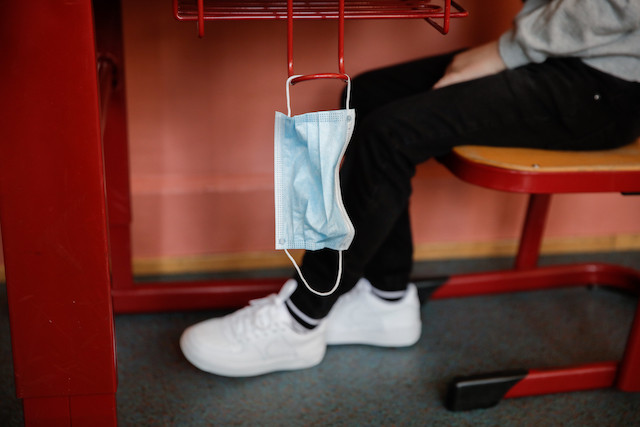“The children are getting fatigued. There is this ‘when is this going to end’ feeling,” said Sarah*, who works with preschool and primary pupils at a private school in Luxembourg.
The grand duchy went into lockdown on 16 March 2020 and schools quickly had to adjust to online learning. They reopened in May, leaving some weeks of classroom teaching before the summer break. And while the government aims to keep schools open as much as possible, they were forced to close again for a week in February amid rapidly spreading new virus variants.
“Every time, you’re starting from scratch,” said Sarah about the back and forth, which also sees individual children, classes or years having to quarantine depending on their exposure to the virus, even when the rest of the school stays open. “You see kids really struggle to come back to a social setting, kids that have lost a sense of social skills.”
And while the youngest learners are quick to adapt to new situations, Sarah said anxieties at home translate onto the children. “It’s not the pandemic that stresses them. It’s other things, saying mummy and daddy don’t have time. The feedback from a lot of parents is that they cannot deal with it, keeping up with everything. That household stress is more of the issue. There’s a change of atmosphere in the house.”
Spotting these symptoms is important, the teacher said. “You need to learn to read the children differently,” she said, while also keeping a perspective on what the pupil was like before the pandemic.
Sarah expects that more children will have to repeat a year or require additional support. “Parents have to realise that it’s an unusual setting. It’s not anyone’s fault if your child needs help now. There’s nothing wrong with that,” she said.
But she also urged parents to talk to their children’s teachers, especially when they feel something is going wrong. “You hear parents complaining at the gates about what the teachers are doing wrong. Talk to the school rather than feeding it negatively into your child at home. Step back and see what is best for the kid,” said Sarah, who is herself a mother. “Everyone has a role to play in this situation.”
“We are at a critical point”
A sense of restlessness is also growing among older students at secondary level, said Jérôme*, a chemistry teacher at a Luxembourg high school. “We are at a critical point,” he said. “A lot of people are on the brink and won’t manage this for much longer.”
The teacher said he speaks regularly with his students about the pandemic. “They miss going out, sports, social contacts. It’s difficult to be motivated at school when you don’t have that balance. I remember how important this was for me back in the day, having a way to decompress,” he said. “I really feel sorry for them. It’s the sum of everything that’s weighing on them.”
Making new experiences, testing boundaries, the elation of leaving school, transitioning to university, a first job, and into adulthood--a lot of these experiences are being lost, with no opportunity to re-do them later. This is Generation Covid.
Schools have adjusted to online learning, cutting content from syllabi that’s not essential to proceed to the next year or move on to university. For the chemistry teacher, practical experiments pose a particular challenge and he’s had to cut some of what’s most fun about the subject. “It’s difficult to inspire excitement,” he said. “It’s a completely different type of school.”
And although he said he feels safe at school, Jérôme wishes the sector would be prioritised to get the vaccine, “not ahead of people who are vulnerable, but maybe ahead of people the same age who don’t work in education,” he said. “We are exposed. In what other job do you currently share a room with 25 people? There is a risk at school of the virus passing to more people in a short amount of time.”
The additional load of online teaching, frequently adapting to new guidelines and their own pandemic fatigue are weighing on educators. “Generally, teachers don’t get a lot of sympathy,” Jérôme said. “But I think at the moment not a lot of people would like to trade places with us.”
But he also warned of the toll the pandemic is taking. He expects that it will take around five years for schools to fill the gaps left in the students' education because of the pandemic. The impact on mental health is more difficult to estimate, although signs of burnout are growing, also among staff.
“If things get better in May/June, there is better weather and more freedoms, without a rebound in the autumn, I think the damage will be limited,” the teacher said. “But if it’s another year like this one, I’m pessimistic about how we will cope.”
*Both teachers interviewed requested not to be identified and their names have been changed.
